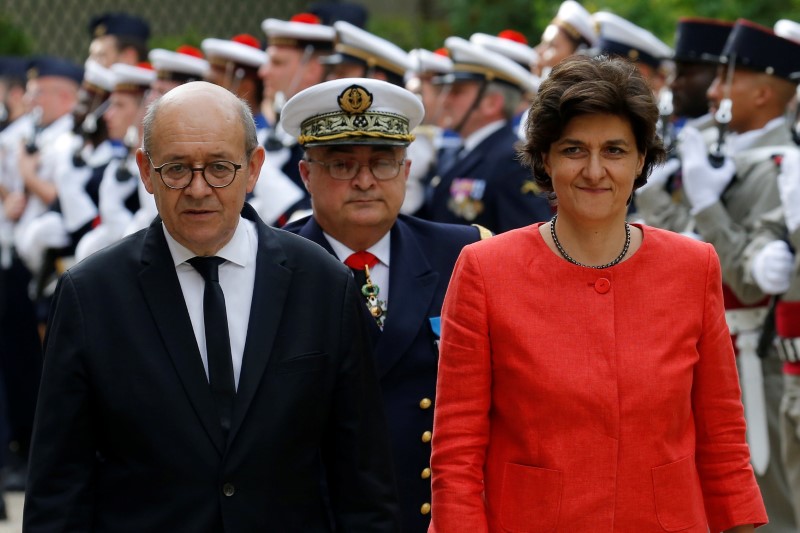By Ingrid Melander and Michel Rose
PARIS (Reuters) - France's centrist President Emmanuel Macron gave ministerial jobs to conservatives, socialists and newcomers to politics on Wednesday, appointing an unprecedented all-stripes cabinet to bridge traditional divides and broaden his support.
Macron's government is a direct challenge to established parties, whose diehards criticised the appointments ahead of mid-June parliamentary elections that will be key to the new president's capacity to carry out reforms and to the future of those traditional alignments.
The 39-year old president, who set up his own party just over a year ago and wants to smash the left-right divide, had already made conservative Edouard Philippe his prime minister earlier in the week.
Posting on Twitter a picture of the pair in a gilded room of the Elysee presidential palace, Macron called Philippe "the prime minister of a government of unity and renewal to change France."
Philippe told a Reuters photographer: "I have a lot of courage. I will also need luck."
Macron's pick for the crucial economy and finance ministry was Bruno Le Maire, a pro-European free-marketeer and a heavyweight from Philippe's The Republicans (LR) party.
Gerard Collomb, the veteran Socialist party mayor of Lyon who was one of the first in his party to back Macron, was named interior minister.
Jean-Yves Le Drian, outgoing Socialist defence minister and a close friend of ex-President Francois Hollande, became foreign minister and minister for Europe.
"This is a French government like no other," said Ifop analyst Frederic Dabi. "That can only shake up the system and bother The Republicans, in particular."
The Republicans, who are biggest challenge to Macron's start-up Republic on the Move party in the legislative elections but lag behind it in opinion polls, accused the new president of trying to muddle the political debate.
"The main objective of this provisional government is to blur the lines and confuse the French people in the parliamentary election campaign," Republicans secretary-general Bernard Accoyer said in a statement, adding that those who joined the government no longer belonged to the party.
The Socialist party labelled the lineup a right-wing government that would "break up public services" and contained too many seasoned veterans to bring any real renewal.
BALANCING ACT
The government appointments are part of a delicate balancing act Macron who was elected president on May 7 on a platform of cutting red tape, boosting investment and relaunching Europe, has to perform ahead of the legislative elections.
By becoming president with no established party backing he has already thrown traditional party loyalties into the air, and early poll predictions show his start-up Republic on the Move will have more lower house seats than any other.
But broadening his base with Republicans and Socialist ministers as well as appointees from other centrist parties, Macron could also be increasing the risk of dissent in future.
"They're trying to make a consensus government in order to get things done, so for the moment I'll give Macron the benefit of the doubt," said Clairinvest fund manager Ion-Marc Valahu.
Other appointments included Francois Bayrou, the head of the centrist Modem party, as justice minister and Marielle de Sarnez as junior Europe minister. Gerald Darmanin, also a Republicans politician, was named public accounts minister.
In another nod to the importance of Europe for Macron, Sylvie Goulard, a centrist lawmaker in the European Parliament who speaks four languages and is better known in Brussels than in Paris, was named defence minister.
Macron had promised to include figures from civil society in his government. To that end, Nicolas Hulot, a popular environmentalist, was named as ecology minister, a job that includes overseeing energy matters.
Hulot, a former TV presenter and one of France's best-known ecologists, has been critical of nuclear energy though not an ardent anti-nuclear campaigner.
Shares in state-controlled utility EDF (PA:EDF), which produces mostly nuclear power, closed down 6.5 percent on the news.
There are a total of 18 ministers. In keeping with his promise of gender balance, Macron named nine men and nine women, but men got more of the top jobs.

The first cabinet meeting will take place on Thursday. Christophe Castaner, Macron's campaign spokesman, was appointed government spokesman.